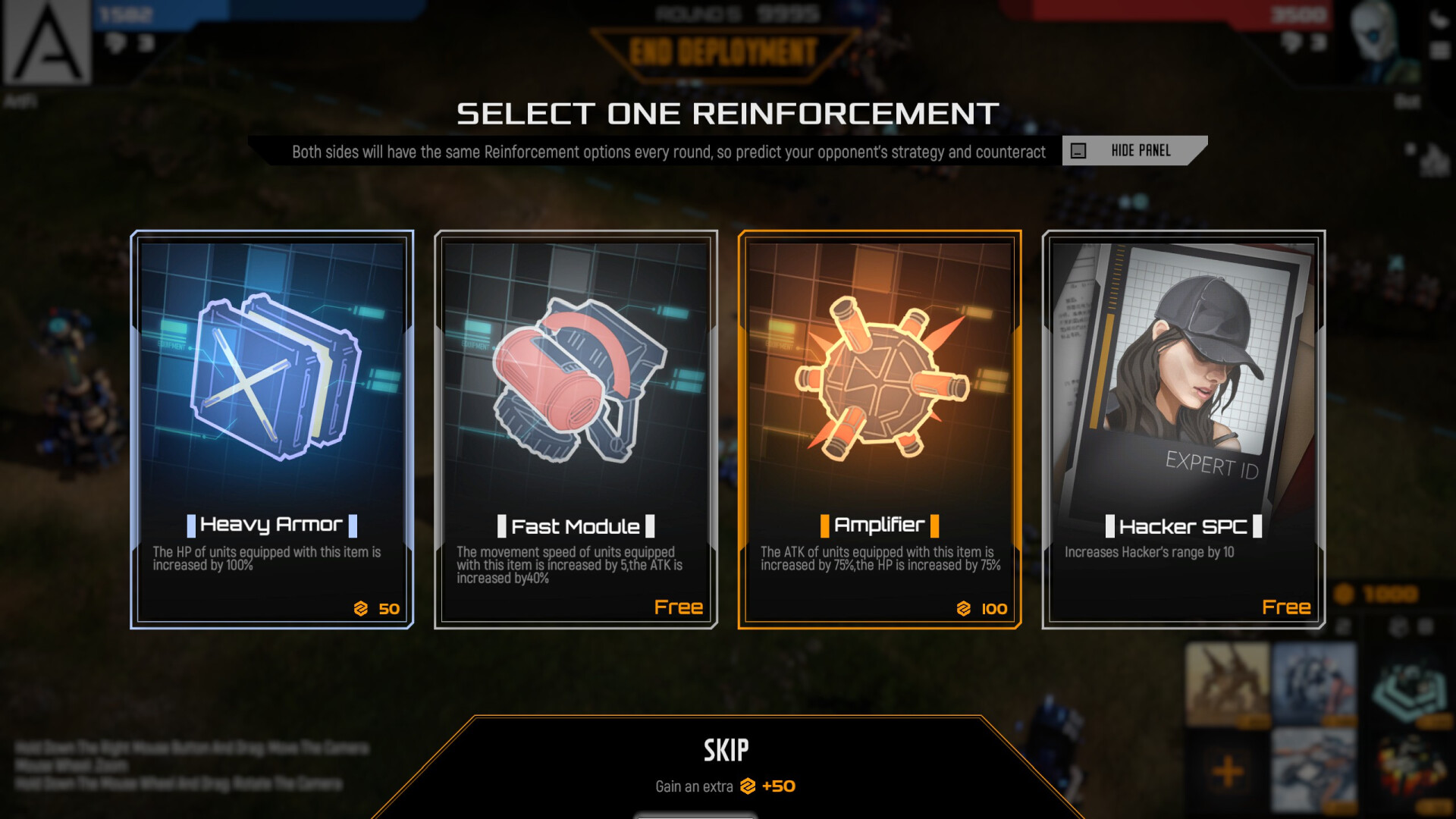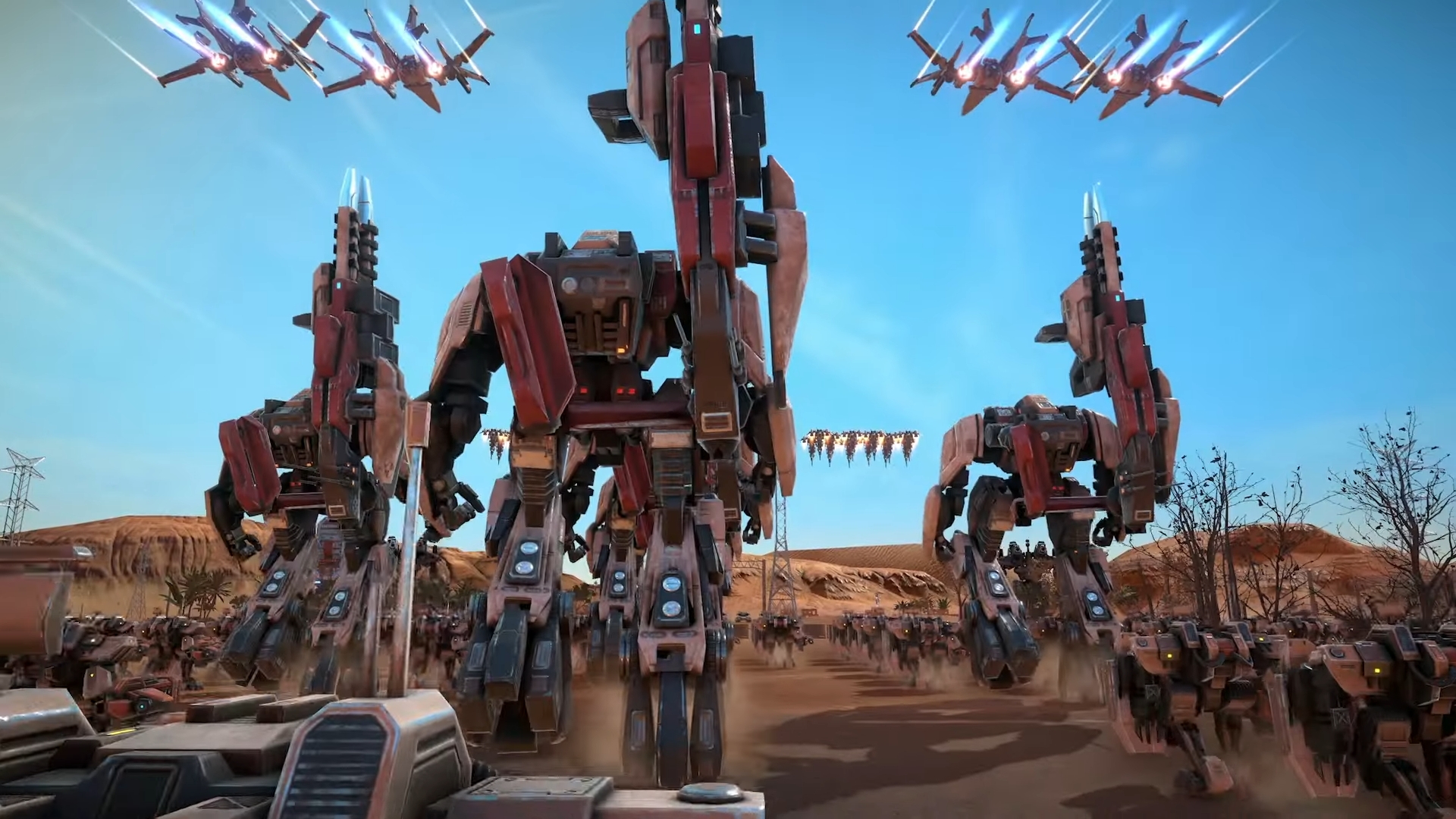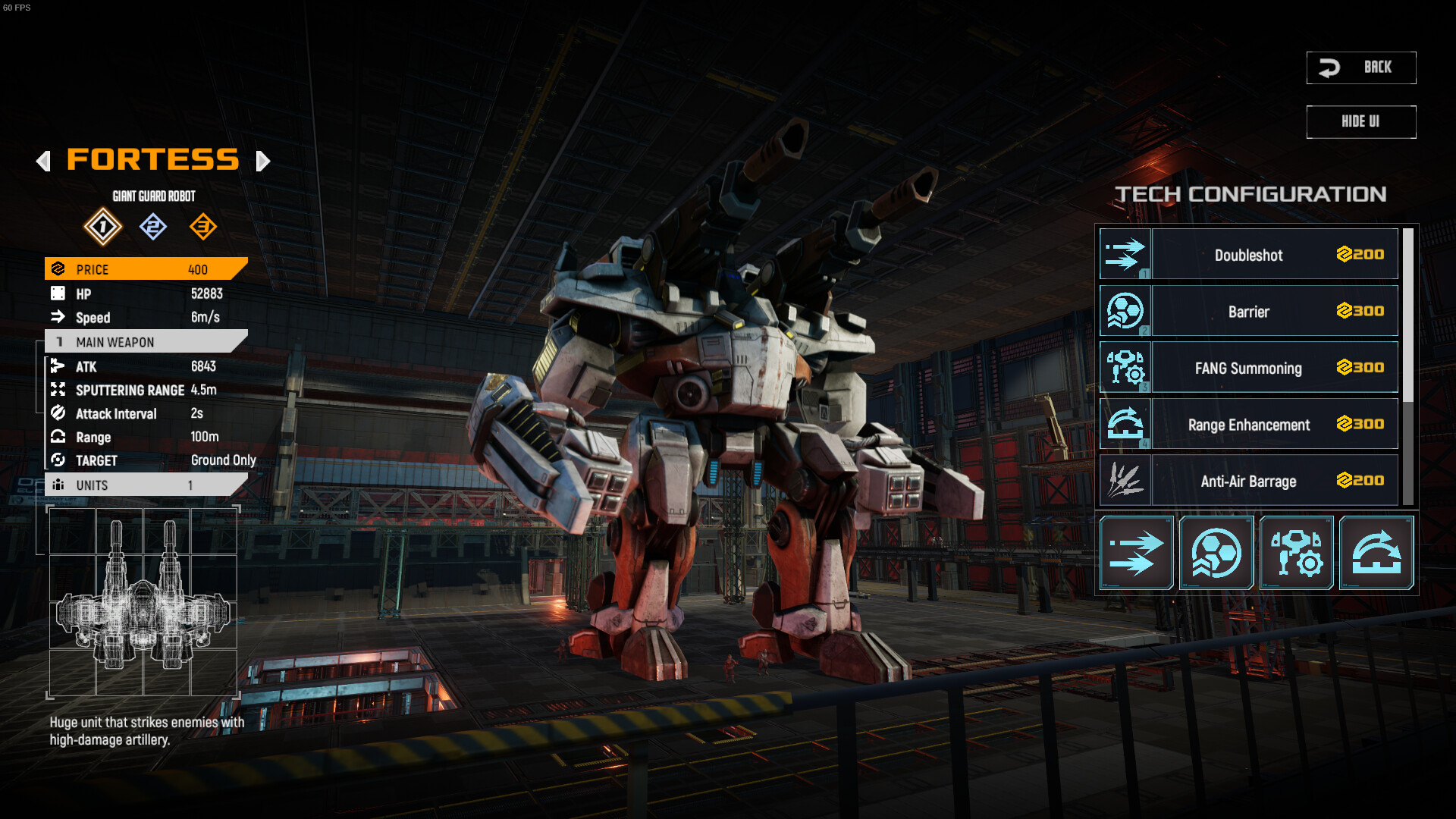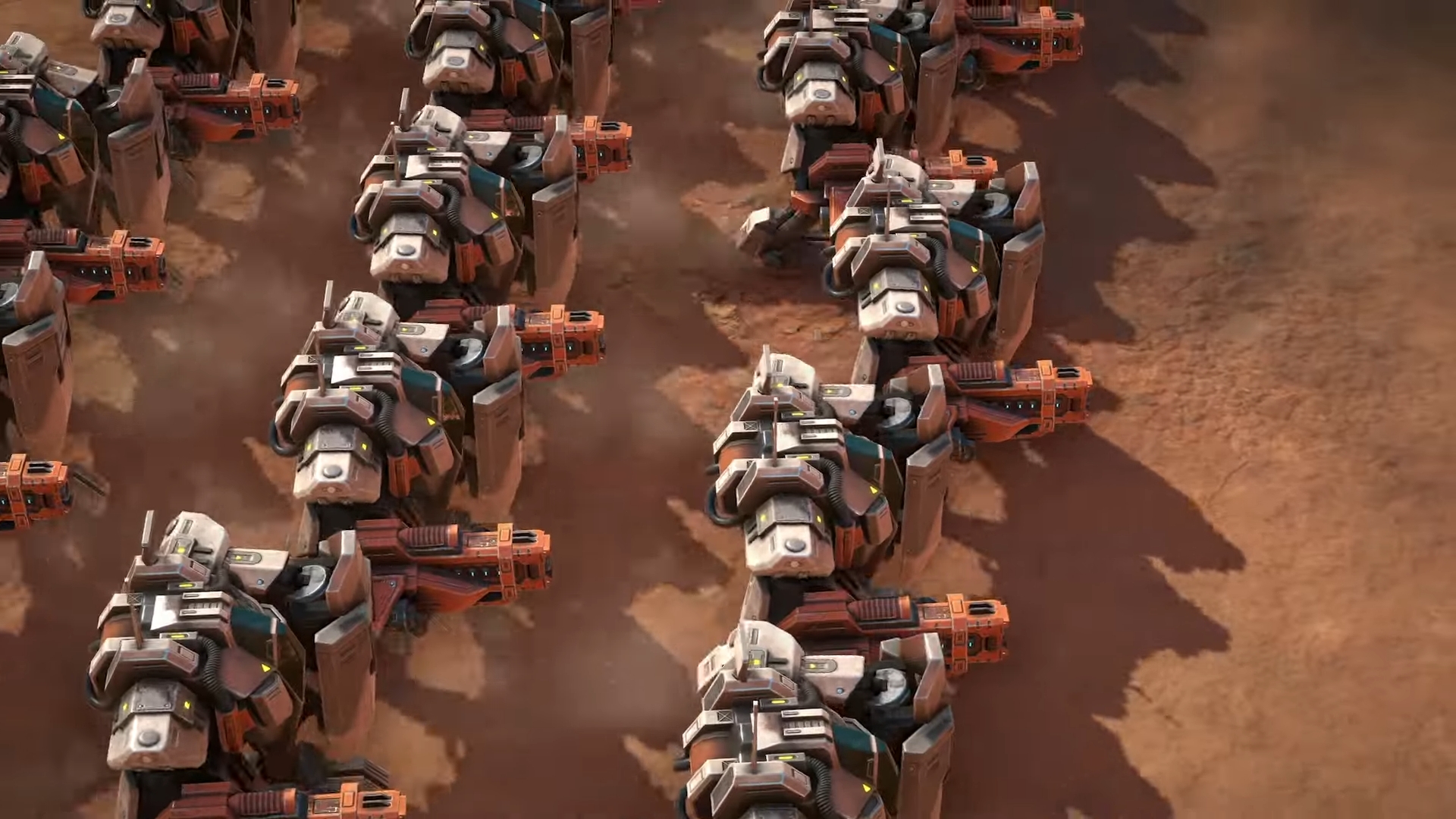I can't stop playing this autobattling strategy masterpiece

It's the seventh round of the match, and my survival is balanced on a hair. My infantry are being mopped up by napalm artillery; infantry I bought to screen my tanks from enemy marksmen mechs, back in round two when that was the biggest problem I had. Once my infantry die to the rockets and fire, my now unprotected tanks die to the snipers. Without a frontline to protect them, my fast-firing autocannon trucks are the next to go, and before you know it my whole formation's fallen apart. My scattered survivors are mopped up, and as I lose the round, I barely avoid losing the whole match with it as my side's hit points get deducted once again for my defeat.
I've been behind the curve all game, and the enemy player's unit composition has me pretty beat—but I have a plan. I buy some crawler drones, one of the cheapest units in the game, and send them out in front of the rest of my forces for round eight. They'll never live long enough to do real damage, but they don't have to. All they have to do is rush forward on their fast little legs and distract the enemy's rocket artillery—napalm-filled rockets, I remind you, as the enemy is reminded when they try to hit my crawlers who've rushed in between them and shoot them straight into their own allies.
The enemy snipers try to shoot over their burning comrades, but with the artillery too distracted with their teamkilling to be destroying my infantry, my soldiers can now do a much better job of meatshielding, protecting my tanks from all those high-damage sniper shots, while my tanks in turn protect my fragile damage dealers behind them. With one little change, suddenly my whole army just works.
In another game my enemy might be able to click on the napalm artillery and tell them to stop friendly firing, but because Mechabellum is an autobattler, all my opponent can do for now is watch and groan. As my mechs and battleships take down the laser artillery that beat them in the round before, the big blue beam too busy wasting time on my smaller units, I turn the tide of the match, and begin to clutch a victory that was headed straight for defeat—and it all started with some cheap little drones throwing the enemy's winning plan into chaos.
Minor but important tweaks like this can have huge impacts in a match of Mechabellum, and when you build up a good army that works together well, it's like fine-tuning a delicate ecosystem of war. That constant adjustment and iteration feels immensely satisfying. Each unit is better or worse at beating another in a vacuum, but it's not just about one-on-ones or playing specific counters; a force of multiple units that combines well to enhance each other's strengths and cover each other's weaknesses will usually beat out some single-minded cheese attempt.
But what if, in that dramatic match I just told you about, the enemy had just repositioned to avoid my drone distraction? Or what if I'd done the same, just shift all my units around to mess with their winning strategy, like shuffling your board around in Teamfight Tactics? That's the best part of Mechabellum: you simply can't. Units can be moved around freely on the first turn you buy them, but after that, Mechabellum's defining rule is those units are now stuck where you set them down, fighting, dying and respawning from the same starting point for the rest of the match.
Like another little strategy game I like called XCOM, Mechabellum isn't about flipping the table every time you make a bad call. An autobattler with consequence, it's about fixing your mistakes and pushing harder on your triumphs, rolling with the punches before your enemy can do it back better, and over multiple rounds of play there's a constant stream of these moments where the balance of power seems to be swinging back and forth with every new deployment.
Because it's an autobattler, Mechabellum gives you ample time to watch those moments and figure out what you'll do about it next. Feeling more like Total Annihilation than its autochess peers, each of Mechabellum's matches scale from a starting skirmish of a handful of cheap units, up to a huge battle of powerful titans and deadly swarms. You build this bigger army piece by piece, one deployment phase at a time, and just like other games in the genre, your units all respawn for a fresh attempt at combat at the start of each new round.
(Image credit: Paradox Arc)
This iterative approach isn't new to autobattlers, but together with each unit being stuck in the same place it's first deployed to, the combined arms roster of Mechabellum's different unit types is in the right ruleset for all of its depth to shine. Sledgehammer tanks do well against crowds with their high-explosive shells, but struggle to beat Steel Balls, laser-armed death rollers that remind me of Total Warhammer's Skaven Doomwheels. But screen those Sledgehammers with a Crawler swarm, and now their single-target lasers can't get through the little horde fast enough—until the enemy plays an Arclight to crowd control your swarm, and then you play high damage Marksmen to exploit their focus on bigger units, and then they buy artillery and you buy flying battleships and the battle scales as you both keep trying to one-up another.
In any other autobattler, the usual choice is to just place the losing units somewhere else and just keep dodging these losing matchups, but because Mechabellum is all about working with the placements you've already made, you have to get better at the mechanics that define its combats, learning what units do their best work in which situations and then using that knowledge to get the most value out of every soldier you place. With limited supplies to go around, bigger and costlier isn't always going to be better, and the way to play isn't to just look up a website that'll tell you what comp you should build for the meta—every match is about using your brain and coming up with as many good answers as you can to the enemy's deployments, or putting out your own strong strategies that will force your opponent to respond.

(Image credit: Paradox Arc)
Those strategies can be enhanced or responded to by choosing from random cards you're offered between rounds, offering anything from modifications to certain unit stats, to special items you can place on single units to improve them, to call-in abilities that provide airstrike-like attacks on a regular cooldown, or just overall buffs like increasing how many supplies you get to spend with during each round's deployment.
While the set of options are random and different each round, Mechabellum keeps things fair by offering the exact same random set to each player, also letting you read your enemy's future moves by knowing whatever they picked was in one of those four cards. You can't see what your opponent's placed each deployment until the battle starts, so prediction is an important part of Mechabellum's matches, and guessing the when, what, and where of how your opponent deploys their units lets you place predictive counters to exploit whatever you think they're about to do.
When it goes wrong, you can make big blunders. When it goes right, you feel like the smartest commander in the world, luring your opponents to choose certain strategies you want them to invest in, and then, rounds later, ambushing them with a planned response that punishes the way they agreed to dance to your encouraging tune.

(Image credit: Paradox Arc)
For instance, there's a giant mech called a Vulcan with twin flamethrowers that will happily barbecue as many crowd units as you can send them. It'd be foolish to buy only Crawler swarms in a match, knowing your opponent could just buy some Vulcans to counter them hard—unless you want them to buy Vulcans.
Then, after throwing some rounds to really wait for them to sink some cost into their countering, you bring out the response and float a bunch of Overlord battleships right into their line of flamer mechs. Vulcans can't shoot up into the sky, so they'll have to buy an anti-air counter, but fast-firing Mustangs and swarming Wasp interceptors can't deal with the Armor Enhancement upgrade you buy for your powerful battleships in the next round, meaning now they'll need Marksmen snipers or Melting Point laser mechs for the high damage needed to beat them. And what do slow-firing Marksmen and single-target Melting Points struggle to deal with? Huge swarms of little cheap Crawler drones.
The swarms you filled the battle with to start off this strategy are not only the initial bait, they're coming back around as the final closing of the trap. Another upgrade on your Overlords specializes in blowing up the big Vulcans before they can fry all your little drones, and while they're playing catch up trying to figure out the right way to to deal with your twists, you're putting out even more new things for them to handle and keeping a firm grasp now on the initiative—throw in some Steel Balls? Buy the burrowing upgrade for your Crawlers? Dump protective shields on your front line and spam theirs with one-use missile launchers? With no real reflex or APM requirement to speak of in a turn-based autobattler, making the right choices from Mechabellum's many options is always the difference between victory and defeat.

(Image credit: Paradox Arc)
There's more to say about Mechabellum; choosing which sets of upgrades to take into matches lets you prepare the options you can buy to tweak your units for different situations in each round, and strategic wrinkles add even more thought to the mix like flank deployment zones that allow for sneaky maneuvering, or defensive objectives that paralyze a side's entire army when one of them is taken down (stop attackers from pushing through to your buildings, or they'll destroy them and leave you vulnerable).
Things like these, and the excellent practice and testing mode that allows you to try out whatever you like in a configurable sandbox, help make Mechabellum the kind of strategy game that's truly strategic, where every decision matters and every wrong call is a chance to learn and improve. Usually while enjoying the game's nicely modeled combat phases, which are an exciting spectacle even when you're firmly on the losing end.
As the persistent damage dealt to win matches is a sum of the supply cost of all remaining units on the field after a round's over, it's not just about winning but by how much you win that makes the difference, and defeats can be avoided by one little unit clutching and taking out enough enemies to soften the overall blow before they eventually go down. I'm constantly cheering for these little heroes, or groaning as I watch my soldiers blunder into the right enemy in the right place. You can't have it all your own way.

(Image credit: Paradox Arc)
Moments like that keep each battle exciting, and the iterative progress of building up your strategy round after round keeps Mechabellum compelling. The live-with-your-choices style of unit positioning is a fresh approach to this style of game, and while at first I came in just hoping for a fun autobattler, what I found was an experience that went beyond the boundaries of the genre to provide me with an incredibly strategic kind of PvP game that I've always wanted, but never had, until now.
Mechabellum is due to launch into Steam early access on May 11. You might find the initial learning curve steep—it took a half-dozen matches before I got a win, and despite playing a lot more since then, I'm still learning new tricks and tactics constantly, so look forward to that if getting deep into games is your kind of jam.
Mechabellum receives plenty of updates, and features team 2v2 battles on top of its excellent 1v1s, as well as a PvE survival mode if you want to comp-stomp alone or in co-op. I'm truly hooked on the PvP myself, so I think I'll be playing this one for a while.




